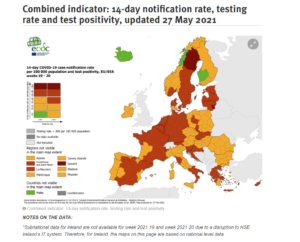The European Commission is urging EU member states to gradually ease Covid-19-related travel restrictions.
On Monday, the Commission also proposed to update the criteria for risk areas and to introduce an ‘emergency brake’ mechanism in order to address the prevalence of new variants of the coronavirus. The proposal also includes provisions on children to ensure families can travel together, as well as a standard validity period for tests.
So far, rules governing the entry of people into countries are largely defined by the member states.
Didier Reynders, commissioner for Justice, said on Monday: “We are proposing that member states coordinate this gradual lifting of free movement restrictions, taking into account our new common tool: the EU Digital COVID Certificate.”
Key updates to the EU-wide approach to travel within the European Union and the European Economic Area include:
- Fully vaccinated persons in possession of vaccination certificates should be exempted from travel-related testing or quarantine. This status should be afforded to people two weeks after they have received their last dose of an EU-approved vaccine.
- The same status should be afforded to persons who recovered from Covid-19 and have already received a single dose of a 2-dose vaccine.
- Recovered persons, holding vaccination certificates in line with the EU Digital COVID Certificate, should be exempted from travel-related testing or quarantine requirements during the first six months after their positive PCR test.
- Persons with a negative test certificate should also be exempted from possible quarantine requirements, says the Commission. It is proposing a standard validity period of 72 hours for PCR tests and, where accepted by a member state, 48 hours for rapid antigen tests.
- ‘Emergency brake’: Member states should reintroduce travel restrictions for vaccinated and recovered persons only if and where the epidemiological situation deteriorates rapidly or where a high prevalence of variants of concern has been registered.
The European Centre for Disease Prevention and Control (ECDC) attributes different colour codes to regions across Europe, depending on their infection rates and other factors. The Commission recommended that member states apply clear and uniform requirements depending on these measures:
- Travellers from green areas: no restrictions apply
- Travellers from orange areas: Member states may require a pre-departure (rapid antigen or PCR) test
- Travellers from red areas: Member states may require travellers to undergo quarantine, unless they have a negative pre-departure test
- Travellers from dark-red areas: non-essential travel should be strongly discouraged whle the requirements of testing and self-isolation remain
To ensure family unity, minors travelling with parents should be exempted from quarantine when the parents do not need to undergo quarantine, for example because they are vaccinated. Children under the age of six should also be exempted from travel-related testing.
The Commission also proposed to adapt the thresholds of the ECDC map in view of the epidemiological situation and progress on vaccination. For the areas marked in orange, the proposal is to increase the threshold of 14-day cumulative Covid-19 cases per 100.000 inhabitants from 50 to 75. For the red areas, the proposal is to adjust the threshold range from current 50-150 to 75-150. Effectively, this means that the rules for these two categories will be relaxed.

Photo: Shutterstock
In addition, the Commission has called for further efforts to ensure a smooth rollout of the new EU Digital COVID Certificat, to be operational by 1 July across the EU. Brussels wants authorities in member states to start issuing the certificates already before that date, allowing the document holders to use it immediately. As of 1 June, the EU-run gateway holding the keys to the certificate is operational, the Commission said.
On 20 May 2021, the European Parliament and the Council reached agreement to establish a common EU-wide certificate to facilitate free movement within the EU. However, the project still needs to be formally adopted and enacted by member states. Also in May, the Council amended the recommendation on non-essential travel to the EU, easing restrictions on non-essential travel to the EU, in particular for vaccinated third-country nationals. The threshold for new infections used to determine the list of non-EU countries from where non-essential travel should be permitted was also amended.







